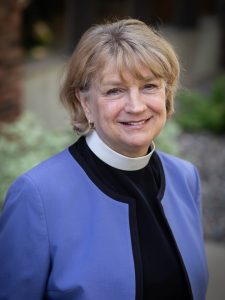 By Bishop Ann Svennungsen
By Bishop Ann Svennungsen
Most every year, my extended family has Sunday worship together during our late July reunion by our parents’ cabin on Montana’s Whitefish Lake. I have a precious photo from 20 years ago when our son, John, directed the closing hymn, “Go Tell it on the Mountain,” with the lake and the mountains framing his image.
This year, the challenge of leading that service felt heavier for me. Like many families, ours is filled with diverse opinions and points of view. I worried that my devotion could easily trip some unexpected political landmine.
“The children were the storytellers; the adults were the listeners.”
In what felt like a gift from God, an idea came to me. How about if I focus on the story of Jesus and invite the children to join me in telling it?
How was Jesus born? Who came to see the baby in the manger? When an adult, what kinds of things did Jesus say? Did Jesus help people? Did Jesus heal people? Did Jesus travel alone? How did Jesus die? What did Jesus say from the cross about forgiveness? Can Jesus’ resurrection help us when we think of our family members who have died? What does Jesus’ life say about God’s love?
It was a delightful conversation, especially watching the children engage. They were the storytellers; the adults were the listeners. And they told the story well.
BACK IN 2004 when I served as president of The Fund for Theological Education, I was privileged to share lunch with Walter and Mary Brueggemann. Of course, I praised Walter for the depth and breadth of his scholarship. Yet, I also said that the article I’d been quoting most often lately was written by Mary, a UCC pastor. Her piece “Pastoral Care in Conflicted Congregations,” (Word and World, 1993) provided strong guidance for me as a pastor leading Trinity Lutheran in Moorhead. She writes:
THESE ARE DIFFICULT TIMES FOR PASTORS, ESPECIALLY FOR THOSE WOMEN AND men working in congregations where conflict is more apparent than mission or where conflict is more compelling than faith. …
It is sometimes the case that in churches which are conflicted, worship is either ignored … or it becomes the battleground for the fight. … No conflict resolution can take place until worship becomes central to the life of the congregation and is alive, thoughtful, and intentional for all members of the church. …
Preaching is central to the liturgy in my own tradition. However, I do not think it is helpful in preaching to focus upon the present situation in the church. Our task is to preach the gospel. Most often in conflicted congregations there is very little ‘good news’ to speak about. … Staying close to the text is a powerful moment both for the preacher and for a congregation closed in on its own problems. The congregation will not miss the connection, say, between David and his struggle with power issues and their own struggle with power issues.
I guess Mary Brueggemann’s words are still speaking to me. Telling the story of Jesus with children was my way of “staying close to the text.”
And yet, I believe that text, that story of Jesus, is powerful enough to bring reconciliation – among families, among communities, even the whole creation.

